Are you ready to revolutionize your business operations and enhance customer experience with the power of GPT?
Don’t let the challenges of implementing this game-changing AI technology deter you. Our team of AI experts is here to help you at every step of the integration process, from identifying potential use cases to training the model and ensuring data security.
Generative Pre-trained Transformers (GPT) is a major advancement in AI, using unsupervised learning to produce human-like text. It has revolutionized business operations across various sectors by allowing machines to understand and generate text similar to humans. GPT can be used in content creation, marketing, and customer service, specifically in training chatbots.
However, businesses may face challenges in implementing GPT, such as the need for high-quality training data and technical expertise. Despite data security issues, GPT offers significant benefits including enhanced customer experience, task automation, improved efficiency, and data-driven decision-making. Successful integration of GPT requires a well-defined adoption roadmap.
Table of Contents
- Introduction: Understanding GPT and its Significance in Modern Business
- The Evolution of Artificial Intelligence: How GPT Transforms Business Operations
- Unleashing the Power of GPT: Exploring its Capabilities and Potential Applications
- Overcoming Challenges: Implementing GPT in Your Business Strategy
- GPT Adoption Roadmap: Key Steps to Successfully Integrate AI into Your Operations
- Enhancing Customer Experience: Leveraging GPT for Personalization and Engagement
- Streamlining Operations: GPT’s Role in Automating Tasks and Improving Efficiency
- GPT and Data Security: Ensuring Privacy and Mitigating Risks
- Real-World Success Stories: Examining Businesses that have Thrived with GPT Integration
- Final Thoughts
Introduction: Understanding GPT and its Significance in Modern Business
Artificial Intelligence (AI) has become a game-changer for modern businesses, revolutionizing the way they operate and interact with customers. One of the most significant advancements in AI is the development of Generative Pre-trained Transformers (GPT). GPT is a deep learning model that uses unsupervised learning to generate human-like text, making it a powerful tool for businesses across various industries.
The Evolution of Artificial Intelligence: How GPT Transforms Business Operations
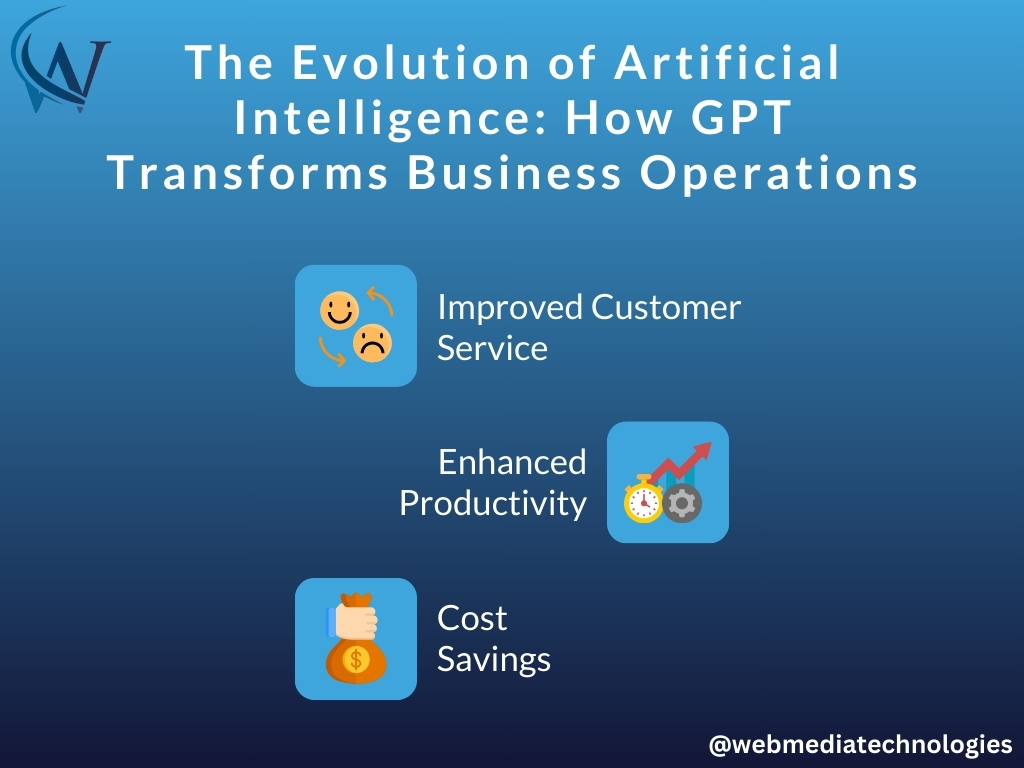
Artificial Intelligence has come a long way since its inception. Initially, AI was limited to rule-based systems that required explicit programming. However, with the advent of machine learning and deep learning techniques, AI has evolved into a more sophisticated and capable technology. GPT, in particular, has transformed business operations by enabling machines to understand and generate human-like text.
Here are the 10 Ways GPT Transforms Business Operations through Artificial Intelligence Evolution:
- Improved Customer Service: GPT-based AI can handle customer queries more efficiently, providing immediate responses and reducing the need for human intervention, thereby improving customer service.
- Content Creation: GPT can generate human-like text, enabling businesses to create content for articles, social media posts, and advertisements at a faster rate and lower cost.
- Decision Making: With the ability to analyze large amounts of data and predict outcomes, GPT can help businesses make informed decisions about marketing strategies, investment opportunities, and more.
- Enhanced Productivity: By automating routine tasks, GPT-based AI can free up employees’ time for more complex and critical tasks, thereby improving productivity.
- Market Analysis: GPT can analyze market trends and consumer behavior, providing businesses with valuable insights that can guide their strategies.
- Personalized Marketing: By understanding customer preferences and behavior, GPT can enable businesses to tailor their marketing messages to individual customers, thereby improving engagement and conversion rates.
- Training and Development: GPT can be used to create personalized training programs for employees, thereby improving their skills and performance.
- Risk Management: By predicting potential risks and providing recommendations, GPT can help businesses mitigate risks and make better strategic decisions.
- Innovation: GPT can generate new ideas and solutions, helping businesses stay ahead of the competition and drive innovation.
- Cost Savings: By automating tasks and improving efficiency, GPT can help businesses reduce their operational costs.
Unleashing the Power of GPT: Exploring its Capabilities and Potential Applications
GPT has a wide range of capabilities and potential applications that can benefit businesses in numerous ways. One of its key strengths is its ability to generate high-quality text, making it a valuable tool for content creation and marketing. For example, GPT can be used to generate blog posts, social media content, and product descriptions, saving businesses time and resources.
Another application of GPT is in customer service and support. By training GPT on customer interactions and frequently asked questions, businesses can create chatbots that can provide instant and accurate responses to customer queries. This not only improves customer satisfaction but also reduces the workload on human customer service agents.
Here are the 10 Potential Applications of GPT in Various Industries:
- Personalized Learning: GPT can be used to create personalized learning experiences for students. It can analyze a student’s strengths and weaknesses and provide tailored study materials based on their needs.
- Medical Diagnostics: GPT could be trained on medical data and help doctors and nurses by providing preliminary diagnoses or suggestions for treatment plans based on symptoms.
- Legal Documentation: GPT can assist law firms by creating drafts of legal documents such as contracts or wills, based on the specific needs and instructions of the client.
- Human Resources: GPT can be used to screen CVs and cover letters, aiding HR teams in identifying potential candidates for job vacancies.
- Real Estate: GPT can help in generating dynamic property descriptions, making property listings more attractive and compelling to potential buyers.
- Personal Assistants: GPT can be the backbone of a new generation of personal assistant apps, helping users manage their schedules, set reminders, and even suggest activities based on their preferences.
- News & Journalism: GPT can be used to create news articles or reports, especially for topics that require rapid updates or for publications with limited resources.
- Market Research: GPT can analyze market trends and provide businesses with insights that can help them make strategic decisions.
- Entertainment: GPT can be used to create scripts for movies, TV shows, or video games, speeding up the creative process and providing new, unique storylines.
- Social Media Management: GPT can help businesses manage their social media presence by creating engaging content, responding to comments, and analyzing trends in follower engagement.
Overcoming Challenges: Implementing GPT in Your Business Strategy
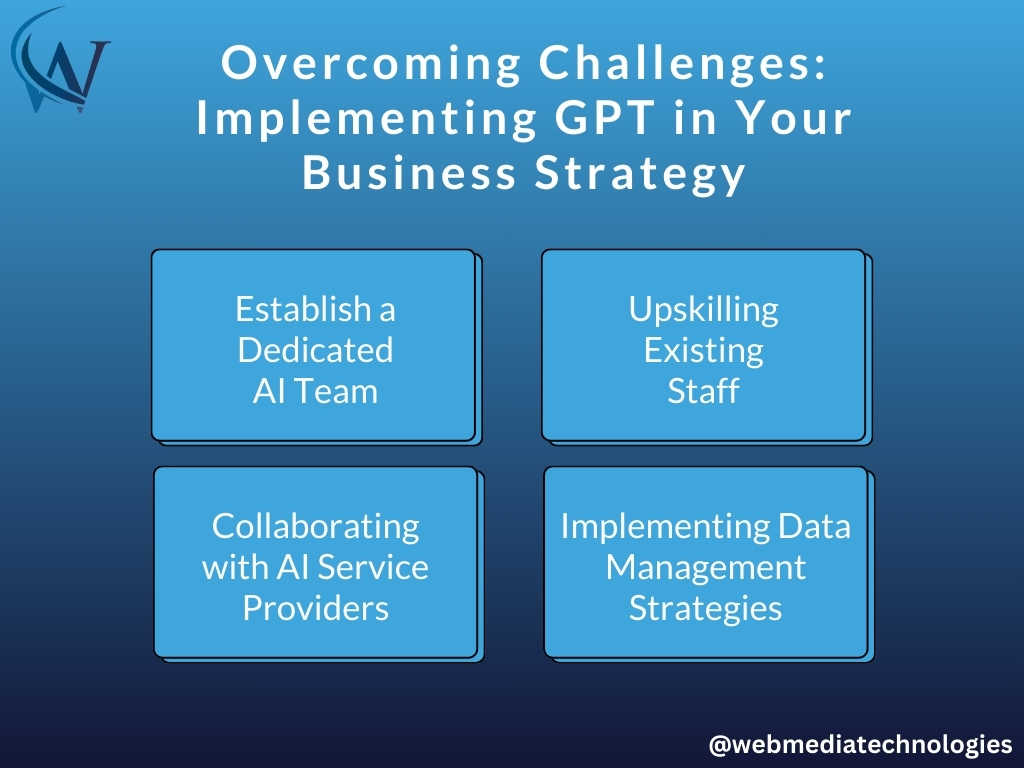
While the potential benefits of GPT are immense, implementing it in a business strategy can be challenging. One of the main challenges is the availability of high-quality training data. GPT requires a large amount of diverse and relevant data to generate accurate and meaningful text. Businesses need to invest in data collection and preprocessing to ensure the effectiveness of GPT.
Another challenge is the need for technical expertise. GPT is a complex technology that requires skilled professionals to train and fine-tune the model. Businesses may need to hire data scientists or partner with AI service providers to successfully implement GPT in their operations.
- Establish a Dedicated AI Team: To overcome the technical challenge, businesses can establish a dedicated AI team, capable of handling the complexities of GPT technology. This team would be responsible for training and fine-tuning the model.
- Data Partnerships: Businesses can form partnerships with data providers to ensure the availability of high-quality, diverse, and relevant data, thereby overcoming the data challenge.
- Upskilling Existing Staff: Businesses can invest in upskilling their existing staff to handle GPT technology instead of hiring new data scientists, which can be costly.
- Collaborating with AI Service Providers: AI service providers have the technical expertise and experience needed to implement GPT effectively. Collaborating with them can significantly mitigate the challenges associated with GPT implementation.
- Utilizing Cloud-Based GPT Solutions: Cloud-based solutions can significantly reduce the technical and data-related challenges associated with GPT.
- Implementing Data Management Strategies: By implementing effective data management strategies, businesses can ensure the availability of high-quality training data.
- Pilot Projects: Starting with small pilot projects can help businesses understand the complexities associated with GPT implementation and help them prepare for larger-scale implementation.
- Regular Training Updates: Regularly updating the training of the GPT model can help maintain its effectiveness and relevance.
- Legal and Ethical Considerations: Businesses must consider the legal and ethical implications of using GPT in their operations to avoid potential pitfalls.
- Continuous Monitoring and Evaluation: Monitoring the results generated by GPT and evaluating its effectiveness can help businesses identify and address any challenges promptly.
GPT Adoption Roadmap: Key Steps to Successfully Integrate AI into Your Operations
To successfully integrate GPT into business operations, a well-defined adoption roadmap is crucial. The first step is to identify the specific use cases and applications of GPT that align with the business goals. This involves conducting a thorough analysis of existing processes and identifying areas where GPT can add value.
The next step is to gather and preprocess the necessary training data. This may involve collecting data from various sources, cleaning and organizing it, and ensuring its quality and relevance. Data privacy and security should also be considered during this stage to protect sensitive information.
Once the training data is ready, businesses need to train the GPT model using appropriate algorithms and techniques. This requires technical expertise and computational resources. Fine-tuning the model and optimizing its performance is an iterative process that may require multiple iterations.
- Align GPT Use Cases with Business Goals: An initial assessment is necessary to understand where the GPT technology can be used in the business processes. This involves understanding the strengths of GPT and aligning them with the business needs and goals.
- Conduct Business Process Analysis: Examine current business processes to understand where GPT can play a role to streamline operations, increase efficiency or improve customer service.
- Data Collection and Preprocessing: Gather the necessary data for training the GPT models. This could be customer data, business data, or any other type relevant to the business. Clean, organize, and ensure the quality of this data.
- Address Data Privacy and Security: When dealing with data, especially customer data, privacy and security should be prioritized. This involves implementing security protocols and following laws and regulations regarding data handling.
- Train the GPT Models: With the necessary data in hand, the next step is to train the GPT model. This involves using AI algorithms and techniques and requires technical expertise and computational resources.
- Model Fine-Tuning: After the initial training, the GPT model will need to be fine-tuned. This is an iterative process that involves testing the model, analyzing its performance, and making necessary adjustments.
- Test GPT Model’s Performance: Conduct comprehensive testing of the GPT model to ensure it meets the business requirements and delivers the expected results.
- Implement an Integration Strategy: Once the GPT model is ready, plan its integration into the existing business infrastructure. This may involve modifying current processes or even investing in new technologies.
- Continual Monitoring and Updating: Keep monitoring the performance of the GPT model and update it as necessary. This could involve retraining the model with new data or tweaking the algorithms as needed.
- Employee Training and Support: Ensure that employees understand how to use the new technology and provide them with the necessary training and support. This might involve hiring new talent, reskilling current employees, or partnering with external experts.
Enhancing Customer Experience: Leveraging GPT for Personalization and Engagement
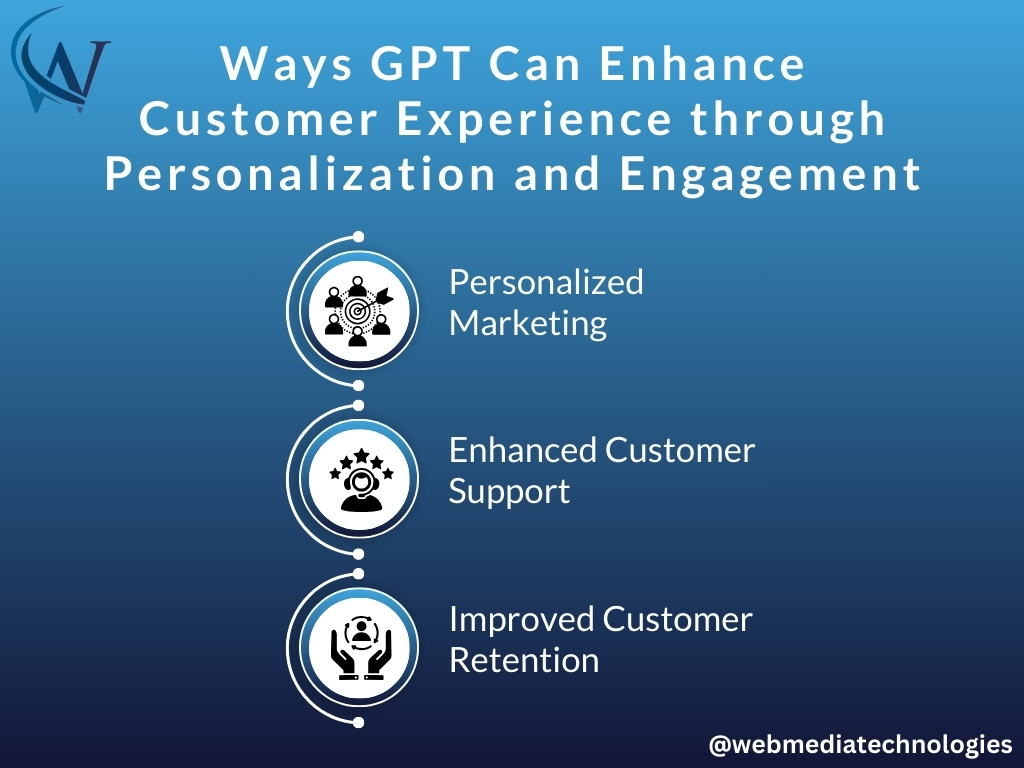
One of the key benefits of GPT is its ability to enhance customer experience through personalization and engagement. By analyzing customer data and preferences, GPT can generate personalized recommendations and offers, improving customer satisfaction and loyalty. For example, e-commerce businesses can use GPT to recommend products based on a customer’s browsing and purchase history.
GPT can also be used to create engaging and interactive experiences for customers. For instance, GPT-powered chatbots can engage in natural and meaningful conversations with customers, providing personalized assistance and recommendations. This not only improves customer satisfaction but also increases conversion rates and sales.
Here are the 10 Ways GPT Can Enhance Customer Experience through Personalization and Engagement:
- Personalized Marketing: GPT can analyze customer behavior and preferences to deliver personalized marketing content, enhancing engagement and conversion rates.
- Enhanced Customer Support: GPT-powered chatbots can provide 24/7 customer support, answering queries quickly and accurately, leading to improved customer satisfaction.
- Interactive User Interface: GPT can be used to develop more interactive and user-friendly interfaces, making navigation easier and enhancing the overall customer experience.
- Tailored Recommendations: GPT can analyze past purchases and browsing history to generate tailored product or service recommendations.
- Personalized Emails: GPT can be used to generate personalized emails, offering products or services based on customer preferences and increasing click-through rates.
- Improved Customer Retention: By providing a personalized and engaging experience, GPT can help businesses retain customers and increase loyalty.
- Efficient Data Analysis: GPT can analyze vast amounts of customer data quickly and accurately, identifying key patterns and trends that can be used to enhance the customer experience.
- Predictive Analysis: GPT can be used for predictive analysis, identifying potential customer needs and providing solutions before the customer even realizes they need them.
- Improved Engagement: GPT-powered platforms can engage customers in real-time, responding to queries, providing recommendations, and even initiating conversations.
- Enhanced UX Design: GPT can be used to understand user behavior and preferences, which can be used to enhance the design and functionality of a website or app for a better user experience.
Streamlining Operations: GPT’s Role in Automating Tasks and Improving Efficiency
Another significant advantage of GPT is its ability to automate tasks and streamline business operations. GPT can be trained to perform repetitive and time-consuming tasks, such as data entry, content generation, and customer support. By automating these tasks, businesses can free up human resources to focus on more strategic and value-added activities.
GPT can also improve operational efficiency by analyzing and extracting insights from large volumes of data. For example, GPT can be used to analyze customer feedback and sentiment, enabling businesses to identify trends and make data-driven decisions. This can lead to improved product development, marketing strategies, and overall business performance.
Here are the 10 Ways GPT Can Automate Tasks and Improve Business Efficiency:
- Automating the Email Response System: Utilization of GPT for managing customer emails can help companies respond faster and more efficiently, resulting in improved customer satisfaction.
- Content Generation: GPT can be used to create high-quality content for blogs, social media, and other digital platforms, thus, reducing the need for a dedicated content team.
- Data Analysis: GPT can analyze and interpret complex data sets, providing valuable insights for decision-making and strategy formulation.
- Customer Support: GPT can be used to automate customer support services, handling basic inquiries and freeing up human agents to deal with more complex issues.
- Personalized Marketing: By analyzing customer behavior and preferences, GPT can help create personalized marketing campaigns, enhancing customer engagement and sales.
- Inventory Management: GPT can be utilized to automate inventory tracking, helping businesses maintain optimal stock levels and prevent overstocking or understocking.
- Operational Efficiency: GPT can automate various operational tasks, reducing errors and improving overall productivity.
- Product Development: GPT can analyze customer reviews and feedback to derive insights, contributing to the development of better products or services.
- Market Research: GPT can automate the process of gathering and analyzing market data, helping businesses understand their target market and competition better.
- Predictive Analytics: GPT can be used to identify patterns in data, helping businesses forecast future trends and make informed decisions.
GPT and Data Security: Ensuring Privacy and Mitigating Risks
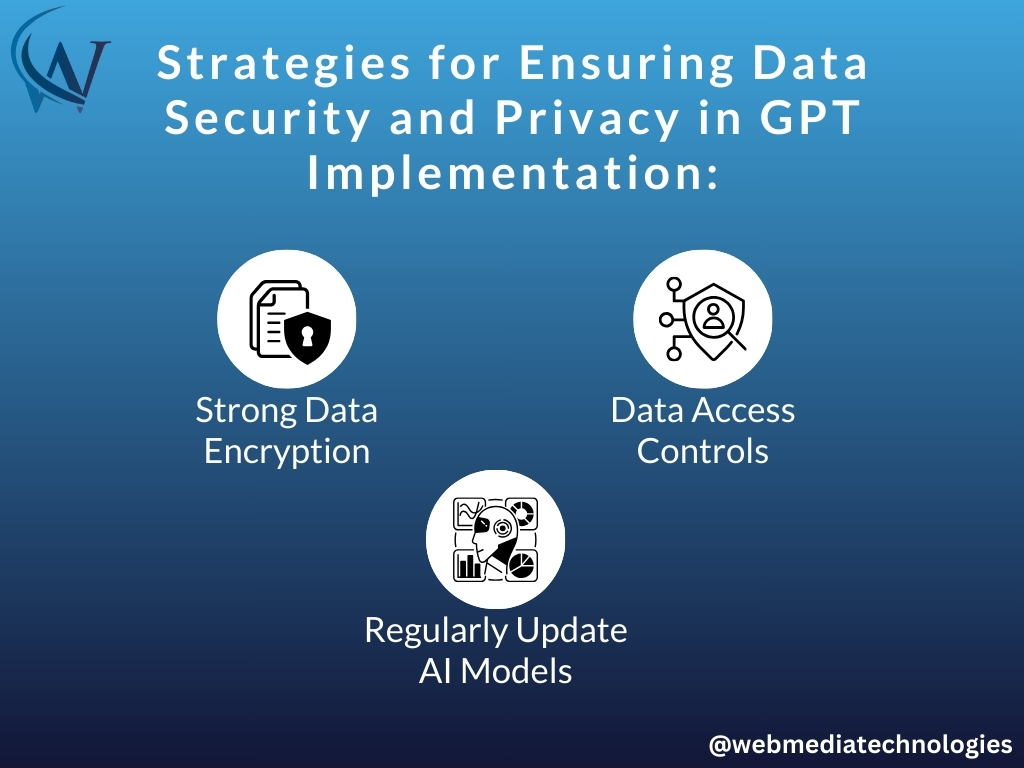
While GPT offers numerous benefits, it also raises concerns about data security and privacy. GPT requires access to large amounts of data to generate accurate text, which may include sensitive customer information. Businesses need to ensure that proper data protection measures are in place to safeguard customer privacy and comply with data regulations.
Additionally, there is a risk of bias in GPT-generated text. GPT learns from the data it is trained on, which may contain biases present in the training data. Businesses need to be aware of this and take steps to mitigate bias by carefully curating and preprocessing the training data.
Here are the 10 Strategies for Ensuring Data Security and Privacy in GPT Implementation:
- Implement Strong Data Encryption: Businesses should incorporate robust data encryption during transmission and storage of data to protect sensitive information from unauthorized access or breaches.
- Regularly Update AI Models: To reduce bias, businesses should frequently update their GPT models with fresh, diverse, and balanced datasets, eliminating any potential bias present in the previous training data.
- Use Synthetic Data: Use of synthetic data, which is artificially created information rather than data collected from real-world events, can reduce the risk of exposing sensitive customer information.
- Anonymize Data: De-identifying or anonymizing the data used in GPT can help in maintaining the privacy of the data subjects while still providing useful information for the AI model.
- Data Access Controls: Implement strict data access controls to ensure only authorized personnel can access sensitive data used for GPT.
- Regular Audits: Conduct regular audits to ensure compliance with data protection regulations and to identify any potential security vulnerabilities.
- Differential Privacy: Use differential privacy techniques during training to add noise to the data, ensuring the privacy of the individuals in the dataset while still allowing the model to learn.
- Secure AI Infrastructure: Ensure the infrastructure used to train and run the GPT models is secure, regularly patched, and updated to reduce the risk of security breaches.
- Data Minimization: Collect and process only the data that is strictly necessary for GPT training to minimize the potential exposure of sensitive information.
- Transparency and Consent: Be transparent about the use of GPT and data collection practices with customers and obtain their consent. This not only builds trust but also ensures compliance with privacy laws and regulations.
Real-World Success Stories: Examining Businesses that have Thrived with GPT Integration
Several businesses have successfully integrated GPT into their operations and achieved significant benefits. OpenAI, the organization behind GPT, has partnered with various companies to explore the potential of GPT in different industries. For example, OpenAI collaborated with a healthcare company to develop a chatbot that provides personalized health advice based on patient symptoms and medical history.
Another success story is the integration of GPT in the financial industry. Banks and financial institutions have used GPT to automate customer support, generate financial reports, and analyze market trends. This has resulted in improved customer service, faster decision-making, and increased operational efficiency.
- ChatGPT: A customer service company successfully integrated GPT into their chatbot systems, resulting in more intuitive and human-like interactions with customers. This has significantly improved customer satisfaction and reduced the workload of their human agents.
- MedGPT: A healthcare start-up used GPT to develop a telehealth application that provides health advice based on symptoms. This has improved access to medical advice for patients in remote areas.
- MarketGPT: A stock trading platform integrated GPT to create a tool that can analyze and predict market trends. This has resulted in better investment decisions for their clients.
- LegalGPT: A law firm successfully used GPT to create an AI lawyer that can draft legal documents and provide legal advice. This has significantly increased the efficiency of their operations.
- TutorGPT: An edtech company integrated GPT into their platform to provide personalized tutoring services. This has improved the learning experience for their students.
- RetailGPT: A retail company used GPT to automate product descriptions and customer reviews. This has improved the accuracy and efficiency of their e-commerce operations.
- HRGPT: A human resources company integrated GPT into their HR systems to automate the processing of resumes and job applications. This has significantly reduced their recruitment costs.
- NewsGPT: A news agency used GPT to automate the writing of news articles. This has resulted in faster news reporting and a significant reduction in their operational costs.
- AdsGPT: An advertising agency integrated GPT into their platform to generate personalized ad copies. This has resulted in higher conversion rates for their clients.
- RiskGPT: An insurance company used GPT to develop a tool that can analyze risk factors and calculate insurance premiums. This has resulted in more accurate risk assessments and improved pricing strategies.
Final Thoughts
GPT is a game-changer for modern businesses, offering a wide range of capabilities and potential applications. By leveraging GPT, businesses can enhance customer experience, streamline operations, and improve efficiency. However, implementing GPT requires careful planning, technical expertise, and consideration of data security and privacy. With the right adoption roadmap and strategy, businesses can successfully integrate GPT into their operations and thrive in the era of AI.
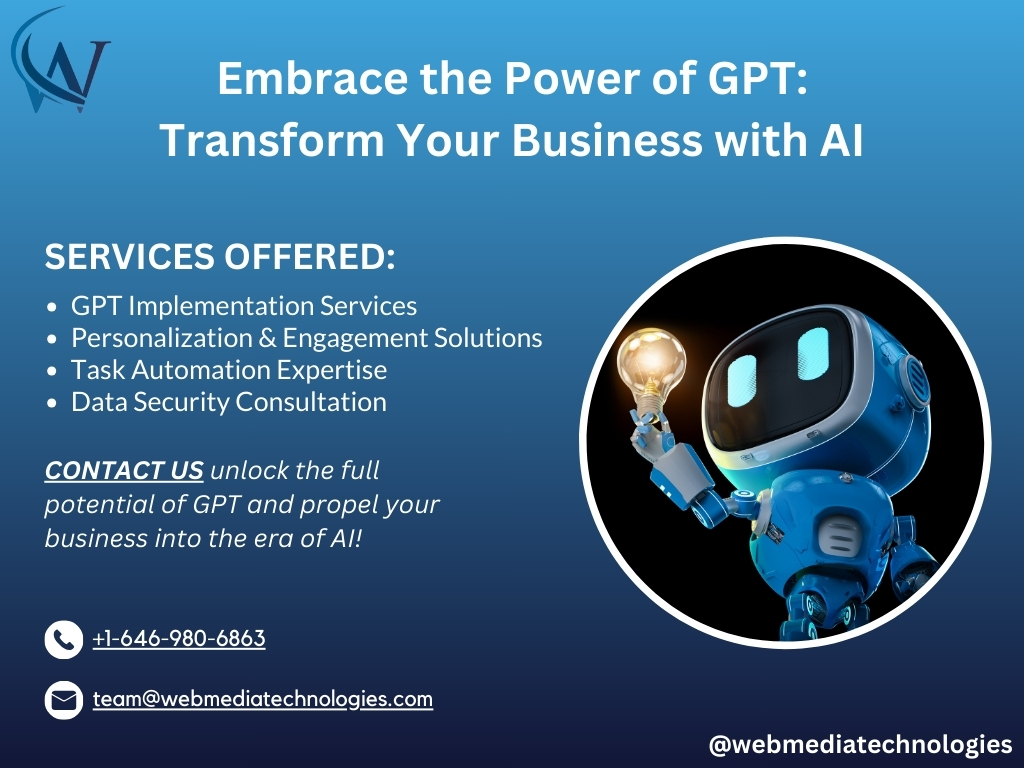
Contact us now to discuss how our services can transform your business in the era of AI.
Let’s embark on this exciting AI journey together!

